Trend Micro Bundle
Who Really Owns Trend Micro?
Delving into the ownership of Trend Micro is essential for understanding its strategic direction and long-term viability in the ever-evolving cybersecurity landscape. This global leader, founded in 1988, has significantly impacted the digital world. From its initial establishment in Los Angeles to its current headquarters in Tokyo, the company's journey reflects a dynamic evolution.
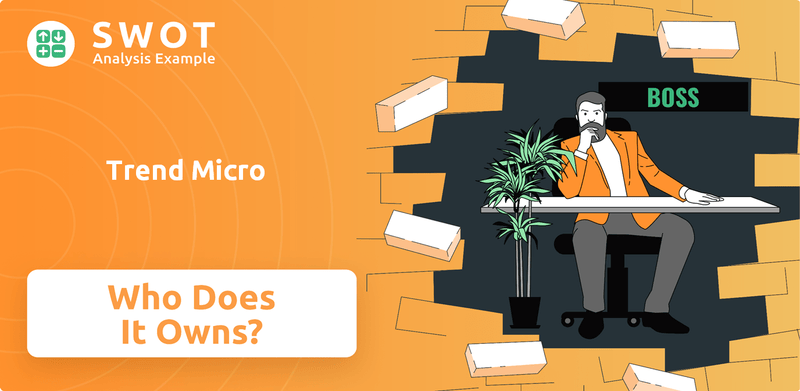
As a publicly traded entity on the Tokyo Stock Exchange (TYO: 4704), understanding the Trend Micro SWOT Analysis is crucial to understanding its strengths and weaknesses. Its ownership structure, a blend of founding family interests, institutional investors, and public shareholders, significantly influences its operations. This exploration will dissect the company's ownership, from its founders to its current stakeholders, providing a comprehensive view of its corporate governance and strategic positioning.
Who Founded Trend Micro?
The cybersecurity firm, was co-founded in 1988. The founders included Steve Chang, Eva Chen, and Jenny Chang. This marked the beginning of a company that would become a significant player in the digital security landscape.
Steve Chang, a Taiwanese-American entrepreneur, played a crucial role as CEO for many years, guiding the company's vision and technological advancements. His sister, Eva Chen, also played a key role, eventually taking over as CEO. Jenny Chang, another co-founder, was also instrumental in the company's initial establishment.
While the specific initial equity distribution isn't public, the founders held a substantial majority stake, typical for early-stage tech startups. This ownership structure provided a solid foundation for the company's early growth and strategic direction. The company's early focus on antivirus software for personal computers, at a time when the internet was still nascent, reflected the founders' foresight into the burgeoning digital threat landscape.
The company was founded by Steve Chang, Eva Chen, and Jenny Chang. Steve Chang served as CEO for many years. Eva Chen later became the CEO.
The company initially focused on antivirus software for personal computers. This was during the early days of the internet. The founders recognized the growing need for digital security.
Early funding likely came from the founders' personal capital. Angel investors or close associates may have also provided support. Public records on these initial private investments are scarce.
The founders held a significant majority stake in the company. This is typical of early-stage technology startups. Specific details on the initial equity split aren't publicly detailed.
There is no publicly available information indicating significant early ownership disputes. The initial phase was relatively cohesive. The founders' vision was deeply embedded in the company.
The founders' vision of providing comprehensive digital security solutions was deeply embedded in the company's early operations. This included product development and strategic direction.
The Revenue Streams & Business Model of Trend Micro shows how the company has evolved. As of 2024, the company continues to be a major player in the cybersecurity industry. The current ownership structure reflects years of growth and strategic adjustments. The company's history, from its founders to its present-day operations, highlights its commitment to providing robust digital security solutions. The company's headquarters are located in Tokyo, Japan. The current CEO is Eva Chen. Understanding the history of Trend Micro ownership provides insights into its long-term success. The evolution of the company, from its early days to its current status as a global cybersecurity leader, showcases its adaptability and strategic vision. The company's commitment to innovation and its focus on customer needs have been key factors in its sustained growth and market share.
Here's a summary of the key points about the company's founders and early ownership:
- Founded in 1988 by Steve Chang, Eva Chen, and Jenny Chang.
- Steve Chang served as CEO for many years.
- Early focus on antivirus software for personal computers.
- Founders held a significant majority stake.
- No public information on early ownership disputes.
Trend Micro SWOT Analysis
- Complete SWOT Breakdown
- Fully Customizable
- Editable in Excel & Word
- Professional Formatting
- Investor-Ready Format
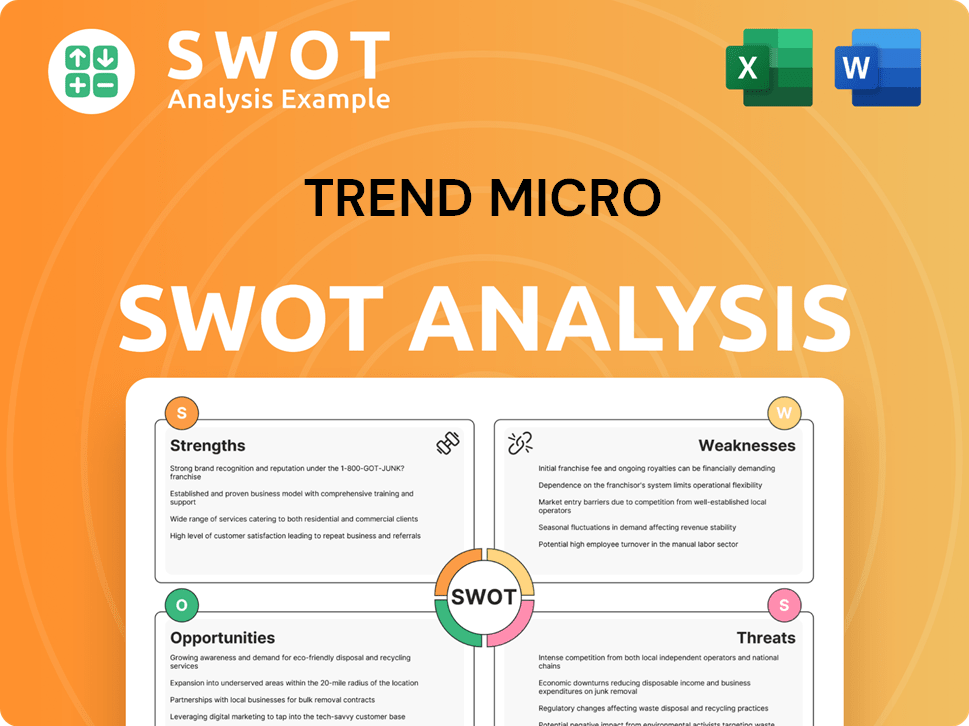
How Has Trend Micro’s Ownership Changed Over Time?
The evolution of Trend Micro's ownership has been significantly shaped by its initial public offering (IPO) on the Tokyo Stock Exchange in August 1998. This pivotal event marked a shift from private ownership to a structure that included public shareholders. The IPO provided capital for expansion and introduced a broader range of investors to the company, fundamentally altering the ownership landscape.
Since the IPO, the ownership structure of Trend Micro has continued to evolve. The company's major stakeholders now encompass a mix of institutional investors, mutual funds, and the founding family. The influence of these different groups plays a role in shaping the company's strategies and direction. Understanding the dynamics of this ownership structure is key to assessing the company's current state and future prospects.
| Event | Impact | Date |
|---|---|---|
| Initial Public Offering (IPO) | Transitioned from private to public ownership, enabling broader investment and capital for growth. | August 1998 |
| Institutional Investor Involvement | Increased influence from large asset management firms and investment funds. | Ongoing |
| Founder and Family Holdings | Continued influence from Eva Chen and related entities. | Ongoing |
As of the fiscal year ending December 2024, the major stakeholders in Trend Micro include the founding family, represented by Eva Chen and related entities, and a significant number of institutional investors. While specific percentages fluctuate, these institutional investors collectively hold a substantial portion of the company's shares. These include firms like BlackRock, The Vanguard Group, and Fidelity Investments. The detailed breakdown of major shareholders can be found in the company's annual reports and SEC filings. The influence of these institutional investors, especially those with long-term investment horizons, can impact company strategy by advocating for strong governance and consistent financial performance. The current CEO of Trend Micro is Eva Chen. The company's headquarters is located in Tokyo, Japan. For more information about the company, you can read a detailed article about the company's history and operations by clicking here: [Trend Micro's history and operations].
Trend Micro's ownership structure is a mix of founders, institutional investors, and public shareholders.
- The IPO in 1998 was a major shift.
- Institutional investors play a significant role.
- Eva Chen and family have a continued influence.
- Understanding the ownership structure is key to assessing the company's direction.
Trend Micro PESTLE Analysis
- Covers All 6 PESTLE Categories
- No Research Needed – Save Hours of Work
- Built by Experts, Trusted by Consultants
- Instant Download, Ready to Use
- 100% Editable, Fully Customizable
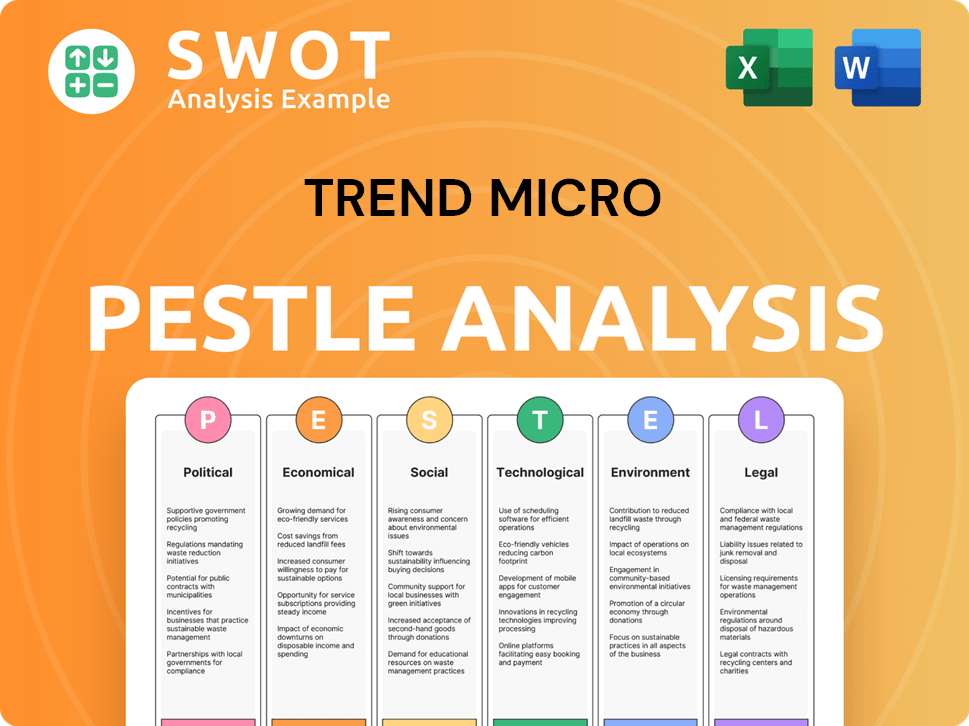
Who Sits on Trend Micro’s Board?
The Board of Directors at Trend Micro, as of early 2025, is pivotal in the company's governance and strategic direction. The board typically includes executive directors, such as key members from the founding family, and independent outside directors. Eva Chen, serving as the CEO, holds a significant position on the board, representing the founders' interests and their ongoing strategic vision. Other board members may represent significant institutional shareholders, although independent directors primarily provide objective oversight and ensure strong corporate governance. Understanding the Growth Strategy of Trend Micro can offer further insights into the board's strategic focus.
The composition of the board reflects the ownership structure and the balance of power within the company. The board's decisions are geared towards maximizing shareholder value while navigating the complexities of the cybersecurity landscape and adhering to regulatory requirements. Trend Micro's corporate governance framework is designed to ensure accountability and transparency, which is crucial for maintaining investor confidence and driving long-term sustainable growth. The board's role is critical in overseeing the company's strategic initiatives and ensuring its continued success in the competitive cybersecurity market.
| Board Member | Title | Notes |
|---|---|---|
| Eva Chen | CEO and Director | Represents the founding family's interests. |
| Independent Directors | Various | Provide objective oversight and ensure good corporate governance. |
| Other Directors | Various | May represent significant institutional shareholders. |
Trend Micro operates with a one-share-one-vote structure, meaning voting power is directly proportional to share ownership. There is no public information suggesting dual-class shares or special voting rights. The founding family likely retains a significant block of shares, influencing the company through their collective voting power and board representation. The company's financial performance and market capitalization reflect the effectiveness of the board's oversight and strategic decisions. As of December 2024, the company's market capitalization was approximately $6 billion.
The board of directors plays a crucial role in Trend Micro's governance. The board includes executive directors and independent directors, ensuring a balance of interests. The company operates under a one-share-one-vote system.
- Eva Chen is the CEO and a key director.
- Independent directors provide oversight.
- Voting power is proportional to share ownership.
- The company's structure promotes accountability.
Trend Micro Business Model Canvas
- Complete 9-Block Business Model Canvas
- Effortlessly Communicate Your Business Strategy
- Investor-Ready BMC Format
- 100% Editable and Customizable
- Clear and Structured Layout
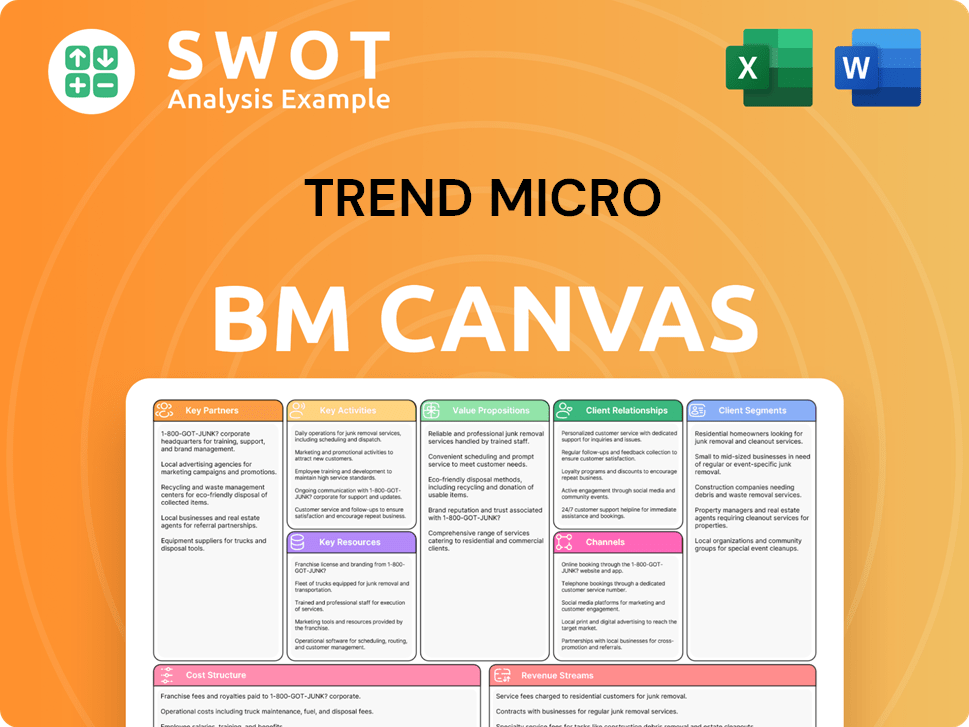
What Recent Changes Have Shaped Trend Micro’s Ownership Landscape?
Over the past three to five years (2022-2025), the Trend Micro ownership structure has remained relatively stable. The company has focused on strategic acquisitions to enhance its product offerings and market reach. For example, the acquisition of Anlyz in late 2023 helped boost its security operations center (SOC) capabilities. These acquisitions, while affecting the financial structure, generally don't change the core ownership unless they involve significant equity issuance to the acquired entity's shareholders. The company's commitment to innovation, supported by a stable ownership structure, is evident in its ongoing investment in research and development.
Industry trends in cybersecurity ownership show a continued emphasis on mergers and acquisitions, along with increased institutional ownership in established players. Environmental, social, and governance (ESG) factors are also becoming more important to investors. As a mature and profitable company, Trend Micro fits the trend of increased institutional investment seeking stable returns. Founder influence, though diluted over time due to capital raising since its IPO, remains notable. There have been no public announcements indicating an imminent privatization or a significant change in its public listing status. The company continues to adapt to emerging cyber threats, which is supported by its long-term strategic vision.
| Metric | Details | Data (2024-2025) |
|---|---|---|
| Market Capitalization | Estimated Value | Approximately $6 Billion USD (as of early 2024) |
| Revenue | Annual Revenue | Approximately $1.8 Billion USD (2024 estimate) |
| Institutional Ownership | Percentage of Shares Held by Institutions | Around 60-70% (as of early 2024) |
The Trend Micro parent company continues to operate with a focus on long-term growth and market leadership. The company's consistent performance and strategic investments, such as the Anlyz acquisition, reflect its commitment to maintaining a strong position in the cybersecurity market. For more insights into their business approach, you can check out the Marketing Strategy of Trend Micro.
Trend Micro is a publicly traded company. The major shareholders include institutional investors and the founding family, who maintain a notable influence. The company's ownership structure has remained relatively stable in recent years.
Trend Micro headquarters is located in Tokyo, Japan. The current Trend Micro CEO is Eva Chen, who also co-founded the company. The company's focus is on cybersecurity solutions.
Founded in 1988, Trend Micro's history includes significant growth and adaptation to evolving cyber threats. The company has expanded its product portfolio through strategic acquisitions. Trend Micro has become a global leader in cybersecurity.
Trend Micro's financial performance has been consistently strong. The company's revenue continues to grow. Trend Micro's market capitalization reflects its position in the cybersecurity market.
Trend Micro Porter's Five Forces Analysis
- Covers All 5 Competitive Forces in Detail
- Structured for Consultants, Students, and Founders
- 100% Editable in Microsoft Word & Excel
- Instant Digital Download – Use Immediately
- Compatible with Mac & PC – Fully Unlocked
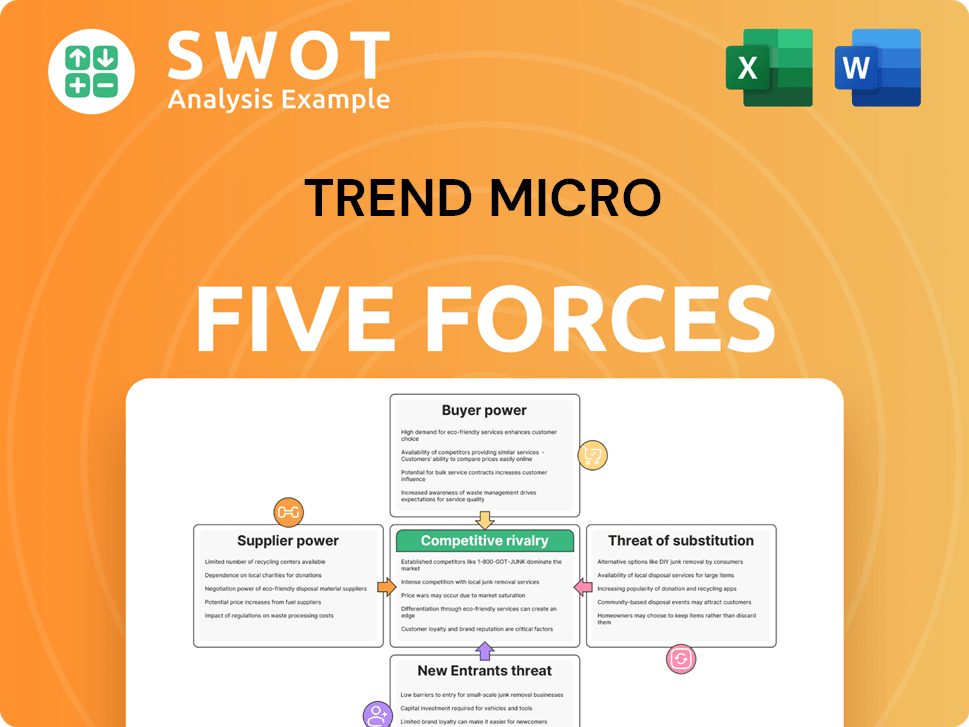
Related Blogs
- What are Mission Vision & Core Values of Trend Micro Company?
- What is Competitive Landscape of Trend Micro Company?
- What is Growth Strategy and Future Prospects of Trend Micro Company?
- How Does Trend Micro Company Work?
- What is Sales and Marketing Strategy of Trend Micro Company?
- What is Brief History of Trend Micro Company?
- What is Customer Demographics and Target Market of Trend Micro Company?
Disclaimer
All information, articles, and product details provided on this website are for general informational and educational purposes only. We do not claim any ownership over, nor do we intend to infringe upon, any trademarks, copyrights, logos, brand names, or other intellectual property mentioned or depicted on this site. Such intellectual property remains the property of its respective owners, and any references here are made solely for identification or informational purposes, without implying any affiliation, endorsement, or partnership.
We make no representations or warranties, express or implied, regarding the accuracy, completeness, or suitability of any content or products presented. Nothing on this website should be construed as legal, tax, investment, financial, medical, or other professional advice. In addition, no part of this site—including articles or product references—constitutes a solicitation, recommendation, endorsement, advertisement, or offer to buy or sell any securities, franchises, or other financial instruments, particularly in jurisdictions where such activity would be unlawful.
All content is of a general nature and may not address the specific circumstances of any individual or entity. It is not a substitute for professional advice or services. Any actions you take based on the information provided here are strictly at your own risk. You accept full responsibility for any decisions or outcomes arising from your use of this website and agree to release us from any liability in connection with your use of, or reliance upon, the content or products found herein.